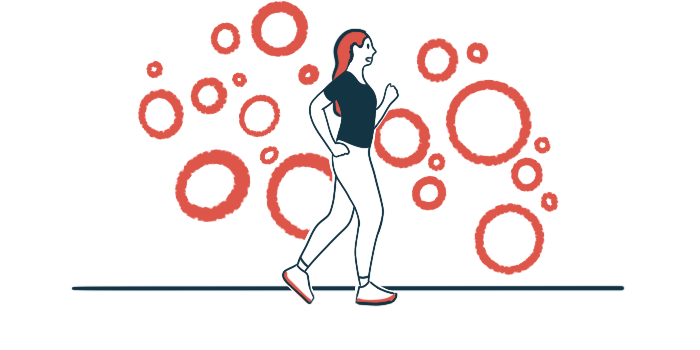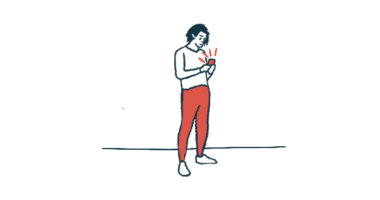Use of Virtual Reality Physiotherapy in MS Found to Boost Adherence
Low dropout rates for therapy used to improve balance, gait in patients

Uses of virtual reality-based physiotherapy to improve balance and gait in people with multiple sclerosis (MS) are linked to lower dropout rates than those found with conventional rehabilitation methods, a review of clinical trials suggested.
Although the difference between the two physiotherapy approaches was not statistically significant, adherence to virtual reality-based exercise was found to be higher than 94%.
“The main clinical implication of the results of our study was that the virtual reality-based training for balance and gait in people with multiple sclerosis was highly accepted with a low dropout rate and high adherence during the study period,” researchers wrote, adding, “This could be especially important for long rehabilitation programmes in chronic conditions.”
Future clinical trials evaluating physiotherapy interventions need to standardize the reporting of dropout cases, according to the team. Also, further studies should address factors that lead to dropout in an effort to improve treatment adherence and outcomes.
The review study, “Dropout rate in randomised controlled trials of balance and gait rehabilitation in multiple sclerosis: is it expected to be different for virtual reality-based interventions? A systematic review with meta-analysis and meta-regression,” was published in the journal Virtual Reality.
Adherence higher than 94% with uses of virtual reality physiotherapy
Physiotherapy, also called physical therapy, has been shown to improve motor abilities in people with MS. Gains have been seen, with treatment adherence, in balance, posture, and walking, as well as in a reduction in the risk of falling.
However, fatigue in MS is a significant barrier to participating in physical activity and can influence patients’ adherence to interventions like physiotherapy. A recent review of clinical trials testing exercise interventions in MS found older age, female sex, and more prolonged interventions were associated with higher trial discontinuations, or dropout rates.
In recent years, different types of virtual reality technologies have emerged as helpful rehabilitation tools, improving physical and cognitive performance. In some neurological disorders, studies suggest adherence to virtual reality physiotherapy may be higher than to conventional therapy.
Now, researchers based at the University of Cadiz, in Spain, conducted a meta-analysis of clinical studies to determine the dropout rates among MS patients who engaged in virtual reality physiotherapy for balance or gait rehabilitation.
“As far as we are concerned, no previous systematic reviews were found reporting dropout in virtual reality interventions for balance and gait rehabilitation in this population,” the team wrote.
A database search yielded 16 eligible randomized clinical trials, totaling 656 participants. These patients were mostly female (65.6%), had a mean age of 45.1, and had significant disability but were still able to walk 500 meters without an aid. Some studies enrolled only patients with relapsing-remitting MS (RRMS), but 11 studies did not specify or distinguish MS type.
In 13 studies, virtual reality intervention was used to improve balance or gait and was compared with conventional balance training (control); three used robotic-assisted gait training as the control intervention. The number of sessions ranged from eight to 54, with most studies having a proposed frequency of twice a week, and sessions that ran between 30–85 minutes.
Across the studies, the mean number of dropout events for those engaged in virtual reality physiotherapy was 1.61 cases compared with 1.88 cases in the control groups.
Dropouts with either invention were mostly due to transportation or scheduling problems, refusal, personal/familial issues, work, lack of motivation or time, data loss, worsening of symptoms, and non-MS medical reasons.
The virtual reality-based training for balance and gait in people with multiple sclerosis was highly accepted with a low dropout rate and high adherence during the study period.
From a total of 638 participants, 63 dropouts occurred, for an overall dropout rate of 6.6% without significant variability of results across the studies. The dropout rate for virtual reality-based interventions was almost half that of controls (5.7% vs. 9.7%), while, conversely, the adherence rate for virtual reality was higher (94.3% vs. 90.3%).
Although the dropout rates for virtual reality physiotherapy were lower than controls, the difference was not statistically significant, meaning the difference may have occurred by chance.
A statistical analysis found no specific factors that contributed to dropping out of virtual reality physiotherapy. This analysis included factors such as sex, MS type, disability, and the type of intervention. Also, the number, frequency, and duration of each session, weeks of intervention, and study quality were factored in.
“Our analysis reported no differences in dropout rate for participants who received virtual reality-based interventions versus other comparators,” the researchers concluded. “However, the lower dropout rate in the virtual reality group could indicate that the inclusion of larger sample sizes would show a significant difference in favor of the virtual reality group.”
“Future randomised control trials should standardize the description of dropout causes and adverse effects of the rehabilitation treatments,” the team suggested. “Furthermore, the advantages of virtual reality, such as motivation and enjoyment, should be systematically assessed in clinical trials to determine whether these outcomes are indeed moderators of dropout and adherence.”







